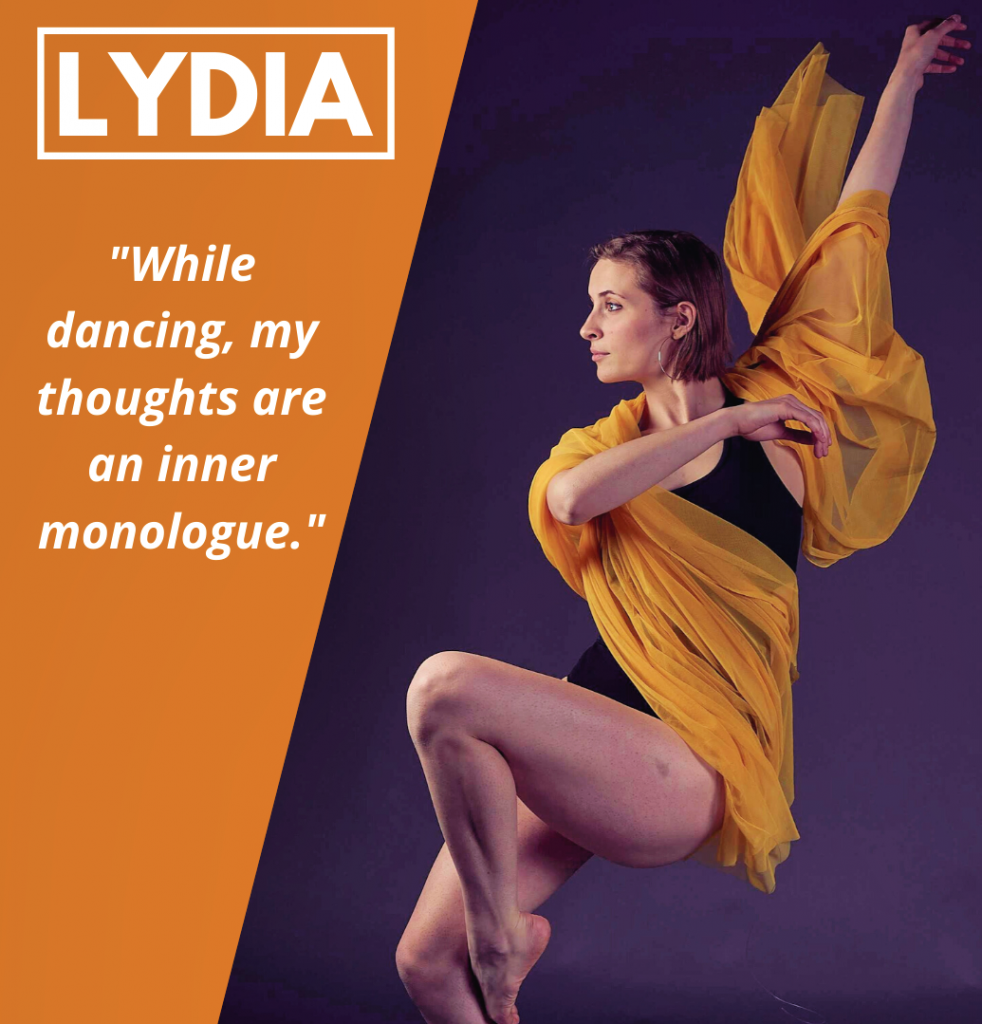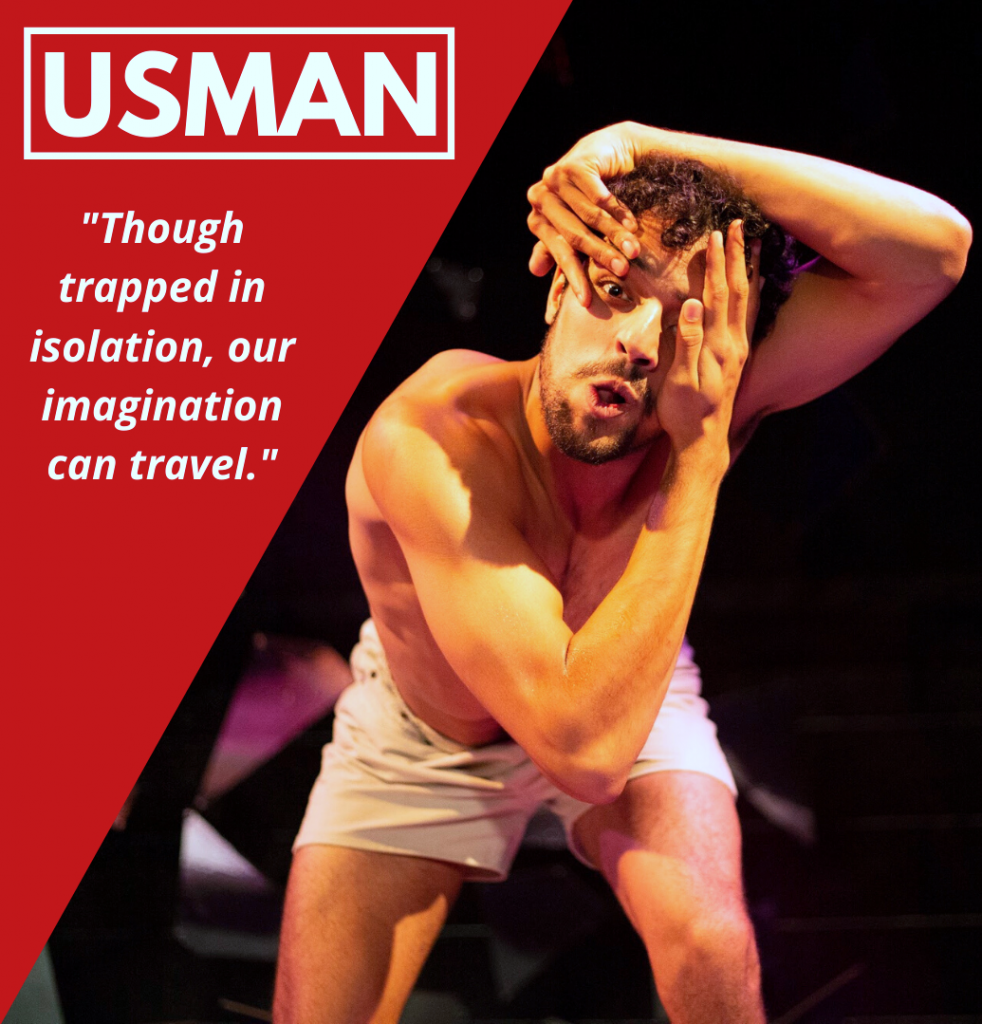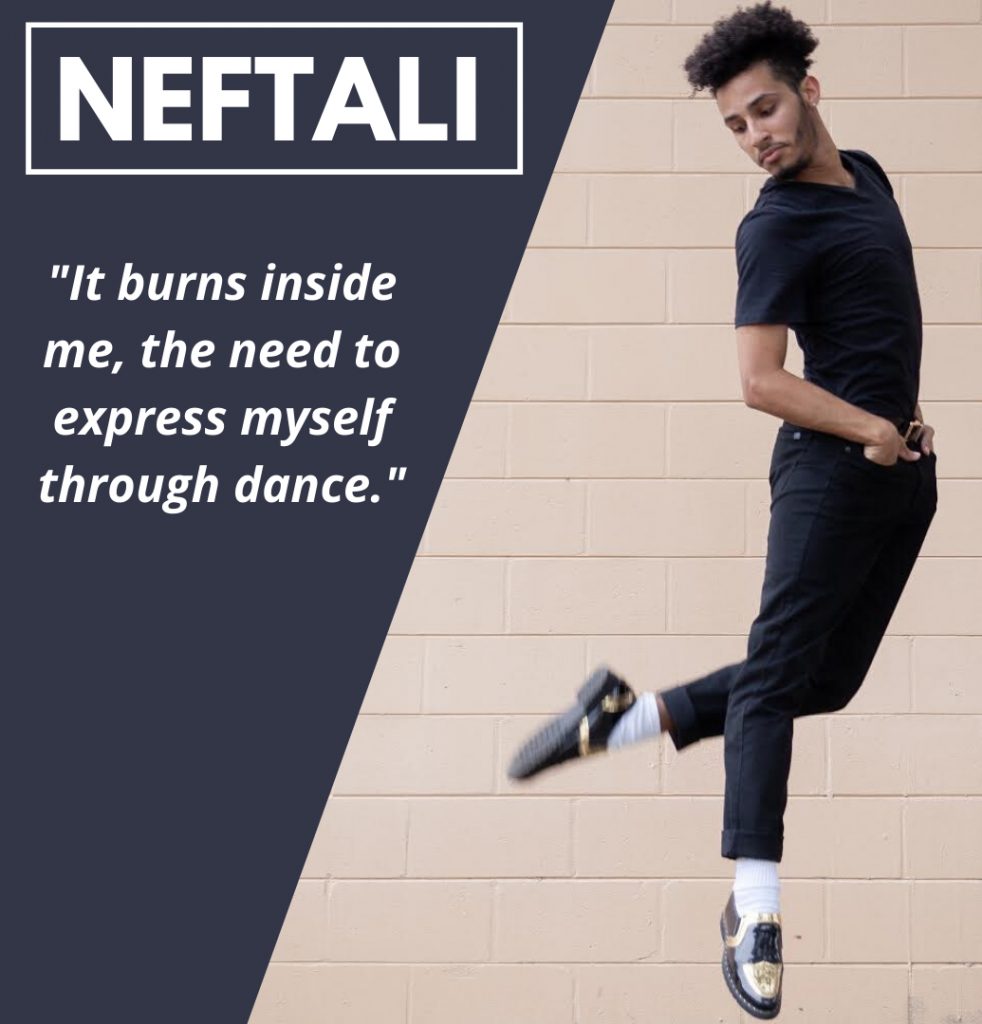2020 Apprentices
Meet Our Summer 2020 Apprentices!
Meet Lydia Kelly
What is the first memory you have of dancing? The first memory of dancing that I have is on the toes of my dad in my kitchen, clutching onto to his legs to keep balance. It is special reflecting on that experience because now I have grown so much in my experiences, dance or not, to be able to walk and/or dance on my own, with my dad now watching rather than assisting.
What is it about dance that speaks to you? Dance speaks to me because it is the unspoken language. I use it to express the complex feelings I have when I don’t know how to form them into words. I see this expression in my peers and at performances. Watching also becomes a form of listening, making the artistry of movement and dance crucial to human conversation.
When you are dancing, whether during a performance or just in your own bedroom, what emotions do you feel? What thoughts do you think? My emotions, while I dance, are never limited: they are allowed to feel as much or as little as they need. Pinpointing a specific emotion is difficult, as they are ever changing, and responding to the moment or movement I am in. Coming from an acting background, the thoughts I often have while I dance are an inner monologue: a complex, discussion with myself, or with those around me.
Has the extra time associated with the quarantine benefited you as an artist? If so, how? Quarantine has offered me an incredible opportunity in reflection and imagining, particularly during March and April when going outside wasn’t as much of an option for me in Upstate NY. I found myself journaling and dreaming about what the future might look like. I found that sometimes my artistry is in need of a major rest before any further work can be done.
Are there any connections you can make to the nation’s current climate to dance – whether it be COVID, being quarantined, fighting for justice, etc. This period is an incredible moment for the dance community to uproot and dismantle the Eurocentric tendencies it has lived with for far too long. It lives and breaths in the veins of our studios, textbooks, and teachings. It thrives on ignorance, and capitalism. This time has been a moment of education for the purpose of dismantling, and unlearning for the purpose of uplifting BIPOC voices, which I intend to do for the rest of my life.
What interests you about/has attracted you to DGDC? I’m looking forward to dancing this summer in new spaces that I’ve never danced in before due to COVID-19. One thing I have learned working with the choreographer is the ability to find opportunity for movement within restrictions. This might include open fields, woods, or even inside my house, all spaces I have yet to dance in before. This is something I think DGDC does very well, and I am looking forward to the opportunity to do this alongside other dancers.
What does The Fantasyland Project mean to you? The Fantasyland Project is an opportunity to have individual and collective discussions through the dance and video medium between company members and audience members. It is a moment to recognize and acknowledge the current moment we are in, as well as create the future of a changed society and world that is about to happen. It is a capturing of this moment that informs us about where we are going.
What expectations do you have from apprenticing this summer? An expectation I have for this summer is the opportunity to dance in unconventional dance spaces. This will further connect the dance and the dancer to the earth, grounding the work in nature’s beauty, rather than solely expecting it in traditional performance spaces, and I’m really looking forward to this.
What is the first memory you have of dancing? When I was in elementary school, I went to a family wedding and joined in on the Bhangra circle that began with absolutely no idea how to follow along. I just closed my eyes, listened to the beat, and started jumping around. At the time, I was told by one of my uncles that I wasn’t dancing but rather jumping around. What he didn’t understand at the time was that you don’t require anything more than rhythm, heart, and intention to dance.
What about dance speaks to you? The opportunity to express in a universal language that fills out the space language cannot reach.
When you are dancing what emotions do you feel? What thoughts do you think? Typically, I’ll be going through breath patterns and try to isolate phrases so as to speak through the movement. The phrase varies and moves on, just like one who jots down thoughts on a journal to express what’s nearly escaping.
Has the extra time associated with the quarantine benefited you as an artist? I think the time to hone in on weaknesses has been valuable. Confinement is quite useful when considering the general lack of space and resources in many walks of our field.
Are there any connections you can make to the nation’s current climate to dance? I rely heavily on watching peers to learn how to advance myself. I think being home has allowed us all to reach within ourselves and refine our authenticity in movement.
Describe how you are feeling about working with the Company. I’m excited to get back into the puzzles! Daniel does a fantastic job of creating easy to follow, yet challenging to execute, works that keep my brain on edge throughout.
What does The Fantasyland Project mean to you? The project signifies an opportunity to imagine beyond our circumstances. Though we are somewhat trapped in isolation, our imagination can travel wherever it pleases.
What expectations do you have from apprenticing this summer? To get back into shape physically, spiritually, and emotionally, and work with some incredible individuals!
Meet Kaitlyn Jackson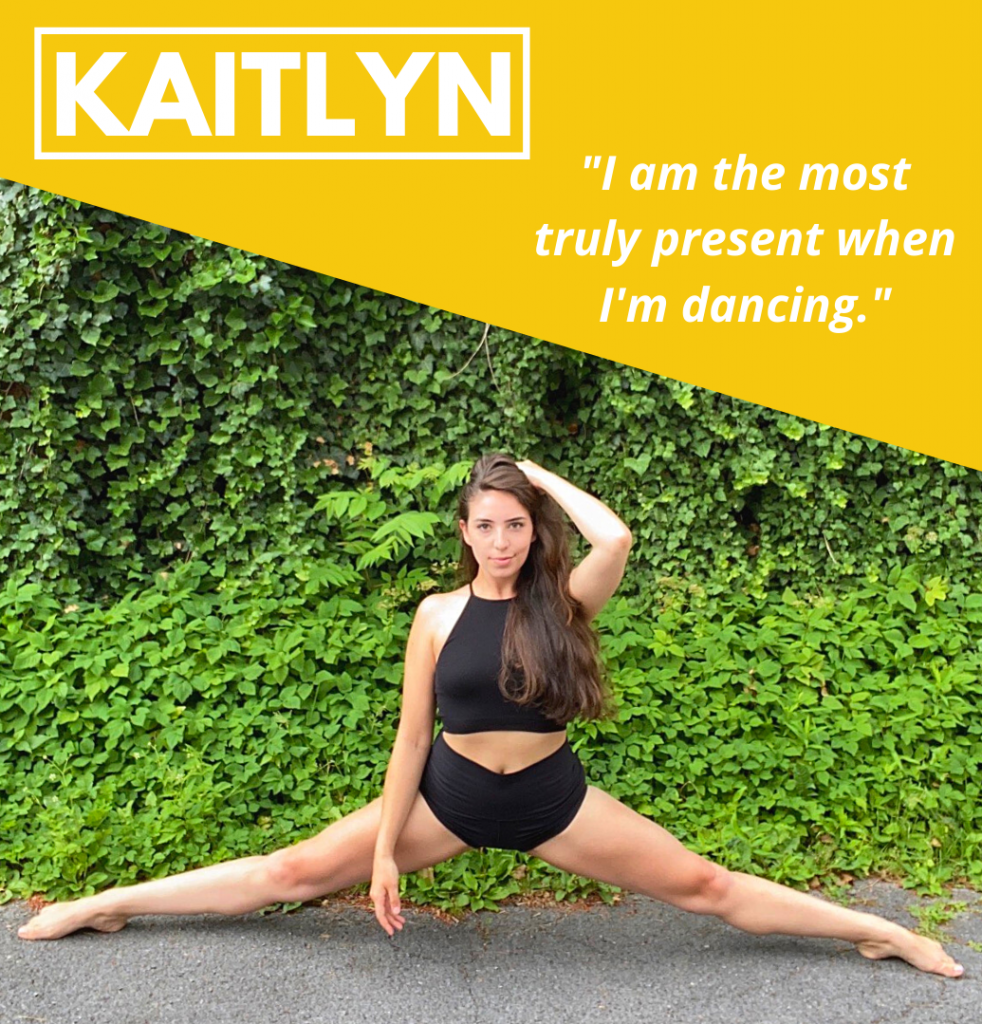
What is the first memory you have of dancing? How does it feel to reflect on that time so many years later? I remember I was scared to go out on stage in my first dance recital. Our dance was called the electric light parade and at one point the whole class held hands and walked around the stage. My dad was backstage with me and when the end of the line came around to us, he pushed me out onstage and handed me to one of the older girls that was assisting our class. After that, I never looked back. It feels nostalgic reflecting on this now but I wouldn’t have had it any other way.
What is it about dance that speaks to you? I love that dance can express emotions and experiences unlike any other art form. It is so amazing to see what the body is capable of and to explore my own body through this lens of limitlessness is truly liberating.
When you are dancing, whether during a performance or just in your own bedroom, what emotions do you feel? What thoughts do you think? Now that I’m reflecting, I’m realizing that I don’t really think of anything other than dancing in the moment of movement. I am the most truly present I have ever been able to be when I’m dancing. I often am encouraged to dance (in my room for example) when I am experiencing a very strong emotion and words just aren’t enough for me to express how I feel. This usually occurs when I’m in a state of distress but, even in these moments, it is more about the experience of physicalizing the emotion when I am dancing and the specific thoughts are no longer at the forefront of my mind.
Has the extra time associated with the quarantine benefited you as an artist? If so, how? I have been trying to do a lot of organizational work in this off time, getting my music book together, finding new material, and just ultimately getting myself prepared for audition culture. I have really not felt creative during these times and I have been really working to accept that that is absolutely fine. Giving myself organizational tasks to do that I can check off has been really helpful in making me feel as if I am still being productive.
Are there any connections you can make to the nation’s current climate to dance – whether it be COVID, being quarantined, fighting for justice, etc. The recent fight for justice for black people has really opened my eyes to the institutionalized racism throughout dance history and the toxic perspectives that are still pervasive in dance culture today. I always knew that the “ballet is the foundation of all dance” argument was a very Eurocentric belief, but I hadn’t stopped to consider the oppression that can truly come from such claims.
What can you say about working with DGDC and dancing the choreography? I am thrilled to be working with DGDC this summer. It is such an honor to be a part of a creative project in times like these when creative work is so scarce. I also am very excited to not only be creative but to get moving, as quarantining is so fundamentally sedentary. I am very excited about the Dance With Us Project because I have had so many experiences of disconnect when talking about dance to non-dancers (or people who have little to no experience in the culture surrounding dance). I am really looking forward to being able to bridge the gap and make dance and talking about dance more accessible to all audiences. I have had lots of experience dancing Daniel’s choreography (both in class and in production) and I have a good sense of how it generally manifests in my body. I am looking forward to the new challenges that will come with the choreography for these new projects.
What does The Fantasyland Project mean to you? In these strange times, trapped in our homes, all that’s really left to do is fantasize about what else there is: other worlds, other dimensions, other realities. The Fantasyland Project, to me, is the visual and nearly tangible manifestation of the human mind and the excess creativity that quarantine is freeing in some and constricting in others.
Joel Oliver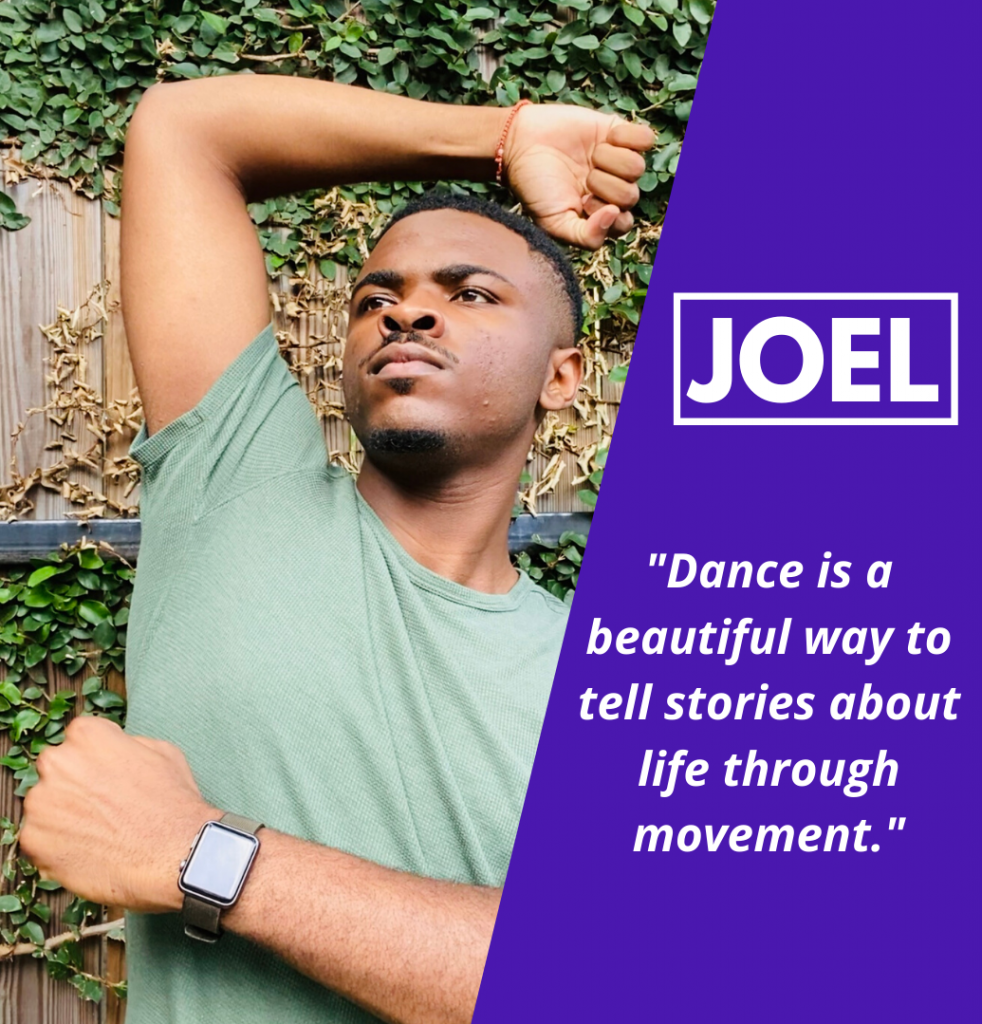
What is the first memory you have of dancing? I remember when I went to my first theatre camp the summer before 1st grade and my favorite part of the day was going to Dance. Just being able to move my body to music that I loved was so much fun. Then I started to love watching people dance and ballerinas. I would pretend I was on a huge stage floating through the air. Captivating audiences.
What is it about dance that speaks to you? When talking isn’t enough to express your emotion, moving your body can be so special to watch. Everyone’s movement is different. We all communicate in different ways. And when you see a performance, it’s a huge expression of their emotions, but through their own way.
When you are dancing, whether during a performance or just in your own bedroom, what emotions do you feel? What thoughts do you think? When I dance, I feel joy! It is also a chance to connect with my body and feel breath moving throughout. I like to think of small conversations with my body when I dance. What would my character say instead of moving? How aggressive or soft is it? And it helps me add my own personality in my movements, but also still connecting to the story.
Has the extra time associated with the quarantine benefited you as an artist? If so, how? This time in quarantine has been a roller coaster of emotions and creativity. When you’re stuck in your home and place of rest, it can be difficult to find moments of motivation. But I tried to find ways to be inspired by the surroundings. Also, trying to get back to what inspired me in the beginning of my journey, listening to soundtracks, watching old videos, and singing old songs really helps to get connected to the first spark of my love for dance.
Are there any connections you can make to the nation’s current climate to dance? Dance can be a great way to see different people and different bodies in a space, all moving together and doing the same thing. It can be a beautiful way to tell stories about life through movement. In a way most people can understand.
How you are feeling about working with the Company? I was very excited to have this opportunity. Working with Daniel briefly in school really made me appreciate the love for dance. His knowledge and attention to detail is so inspiring. When I got to work with him I was challenged by the choreography, but I knew with hard work and focus it would be beautiful. And also understanding that everything is a process and enjoying that.
What does The Fantasyland Project mean to you? The Fantasyland Project means to me that I am seeing the world and scenarios in a euphoric light. Highlighting moments of pure wonder and dreams, being positive or negative.
What expectations do you have from apprenticing this summer? This summer, I’m excited to push myself and be with a company that is working remotely and still bringing beautiful art to audiences. Collaborating with creatives really can help you be inspired more yourself and find your movement. Cannot wait to share my fantasy and be able to tell it through my movement.
Julia Zoratto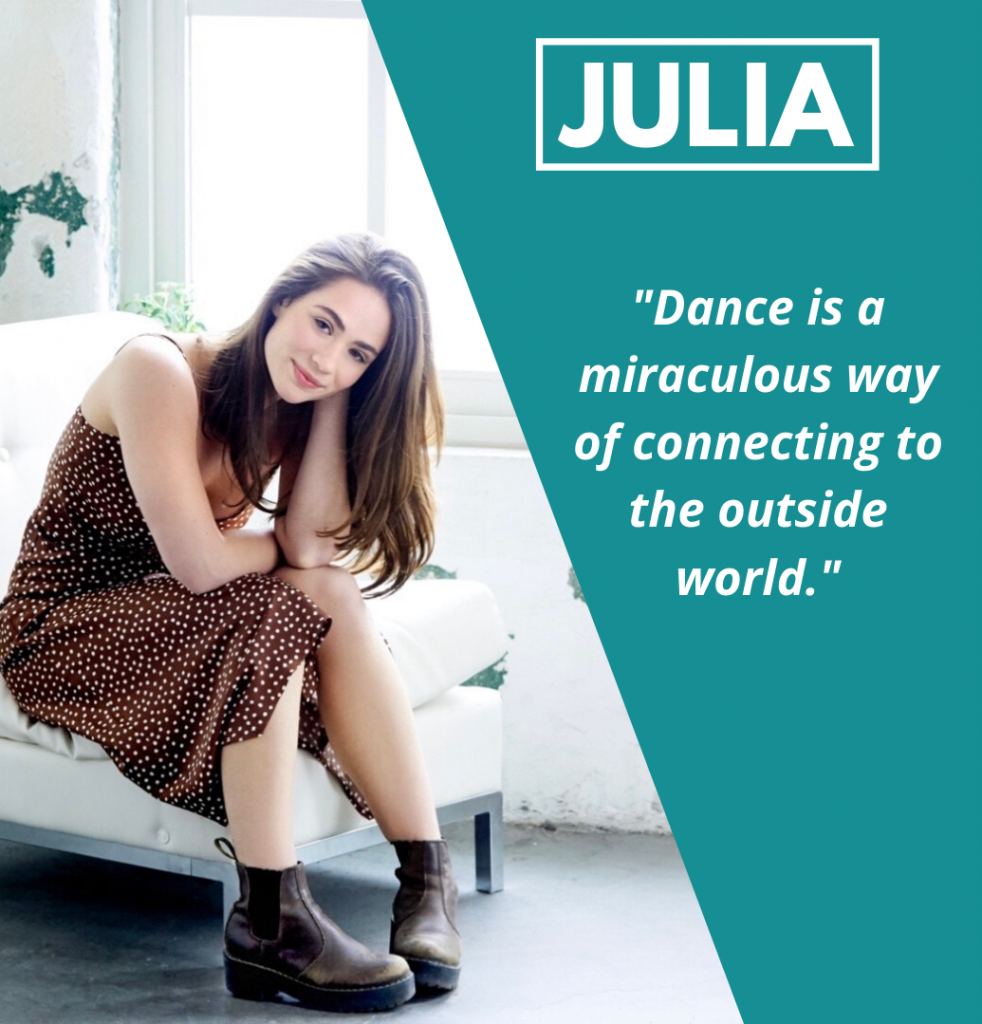
What is the first memory you have of dancing? How does it feel to reflect on that time so many years later? I first remember dancing in class when I was very young, around 3 or 4, learning folk dance to “Shoo Fly Don’t Bother Me.” The beginning of my journey in dance is all very hazy but I believe there is something to be said about learning to dance in conjunction with learning how to do basic cognitive function. When you really embody movement, it’s as if you never learned anything at all- you just have unlocked what was already inside of you. For a long time I was hesitant to call myself a “dancer” because I did not have trust in my abilities, but I now realize that while technical ability is wonderful, dancing is a natural reaction the body has (similar to laughing or crying). Everyone is a dancer but learning how to hone that natural reaction is where art and storytelling happen.
What is it about dance that speaks to you? Dance speaks to me on a variety of levels that include emotional, physical, and artistic. Dance is a miraculous way of connecting what is happening in my body to the outside world. It’s a means of communication without words. It’s cathartic in the sense that through movement I do not need to keep what is inside bottled up. I am able to let that out through movement. Physically I connect to dance because it allows me to connect to my body. It shows me what my body is capable of doing in a wonderful combination of emotions and storytelling. It has given me confidence and strength through the power of recognizing what my body can do through dance. Daniel once said in class that dancing is the closest thing we have to flying and sometimes I really do feel that. Artistically, what I love about dance is getting to watch the transfer of energy through movement in order to tell a story. I love being able to know exactly what is happening just by looking at it. A dance teacher of mine also said that she classifies dance as a visual art and to an extent I can agree with that statement. It gives the viewer the ability to be moved through simply viewing the movement of another human being’s body.
When you are dancing, whether during a performance or just in your own bedroom, what emotions do you feel? What thoughts do you think? Dancing brings people closer. When dancing in performance there often is a specific story or message that the dancer is trying to share with the audience. They must get closer to them, metaphorically or spiritually, to deliver their message. When dancing alone in my room, I often think of stories in my head or I think of the joy of dancing with my friends. That to me is a connection to the human condition. I am able to analyze my surroundings/relationships/experiences and put them to movement. Then there is the act of dancing with friends that literally brings us closer together through a shared experience of freedom and joy. We are able to revel in each other’s presence and move freely, either at weddings, parties, or festivals. Dance is an act of celebration and love among friends and family. Dance, in any capacity, has the capability to bring us together by unlocking freedom in ourselves that can bring us closer to one another for the purpose of telling stories or spreading joy.
Has the extra time associated with the quarantine benefited you as an artist? If so, how? Being in quarantine has reminded me what it is like to move on my own terms. Rarely a day goes by where I do not feel the impetus to move. Pre-quarantine, I was moving nonstop, but I always had to get somewhere. Sometimes, when one is moving at such a fast pace, it is easy to forget why you’re moving in the first place. When the world was forced to stop for its own good, it gave me time to think about why I do what I do. What is it inside of me that gives me the impetus to create? When I don’t technically have to do much, what do I want to create? What do I want to say? How do I want to move? Then there is also the aspect of the current state of the world because of the two pandemics we are experiencing- coronavirus and racism. This time has given me the opportunity to think deeply about what I want to say about society in this moment and how I am going to accomplish that. As artists, it is our job to hold the mirror up to society. What is that going to look like as the world rapidly evolves?
Are there any connections you can make to the nation’s current climate to dance – whether it be COVID, being quarantined, fighting for justice, etc. I think the loss of community in the dance world can be paralleled to the loss of community everyone feels in their own way. The physical studio and interactions with other dancers has been stripped, which could be seen as a devastating blow. But like everyone else in the world, dancers have found a way to manage through Zoom and online classes because like eating, social interactions, and breathing, dance is a necessity, so we will find a way to make it work. When fighting for justice, I think of the visceral reaction many had to recent events regarding police brutality. Some of the visceral reactions were so strong that some were compelled to burn down the buildings that oppressed them. Dance can be that same visceral reaction in some instances. It’s a release physically when you don’t have the words to speak what you are feeling. There comes a time when life reaches a boiling point and the only reaction you can have is to run, scream, or maybe dance.
How you are feeling about working with the Company. I am very excited to be working with the company this summer! I was first introduced to Daniel at Ithaca College where he started teaching as a professor of dance in the 2019-2020 school year. At the time, my relationship with dance was tainted by self doubt. I was in three different dance classes of his where we often learned the company’s choreography and learned about company members. Throughout a year of working with Daniel and embodying his choreography I felt myself grow as a dancer, not only physically, but also mentally. I have grown light-years through this work and I am so happy Ithaca has brought us together. I’m also excited to have the opportunity to rise to the occasion of dancing with a professional company. All my life I’ve grown up learning from teachers who went on to be dancers with different companies so I’ve always been on the outside of that world looking in. I’m very excited to finally be part of this world of company dance for myself!
What’s The Fantasyland Project mean to you? To me, The Fantasyland Project means being able to experience what I always have wanted to live. The nature of a fantasy, to me, is something that takes me away from reality so I can experience relief or catharsis. It’s the feeling of “oh I wish things were this way!” That is not to say that The Fantasyland Project is escapism, which can be dangerous at a time where action is needed. Fantasies can be revolutionary, they can be about change. Fantasies are the final picture of what the world could ideally look like. It’s what could be rather than what is.
What are you expecting from apprenticing this summer? I’m not entirely sure of the ride I am embarking on, but I am excited to join! I’m excited to be surrounded by such talented professional and pre-professional artists. I am excited to be creating work in such a poignant time in history. I expect to grow and be challenged on my own in quarantine but also with other dancers.
Meet Colin McKechnie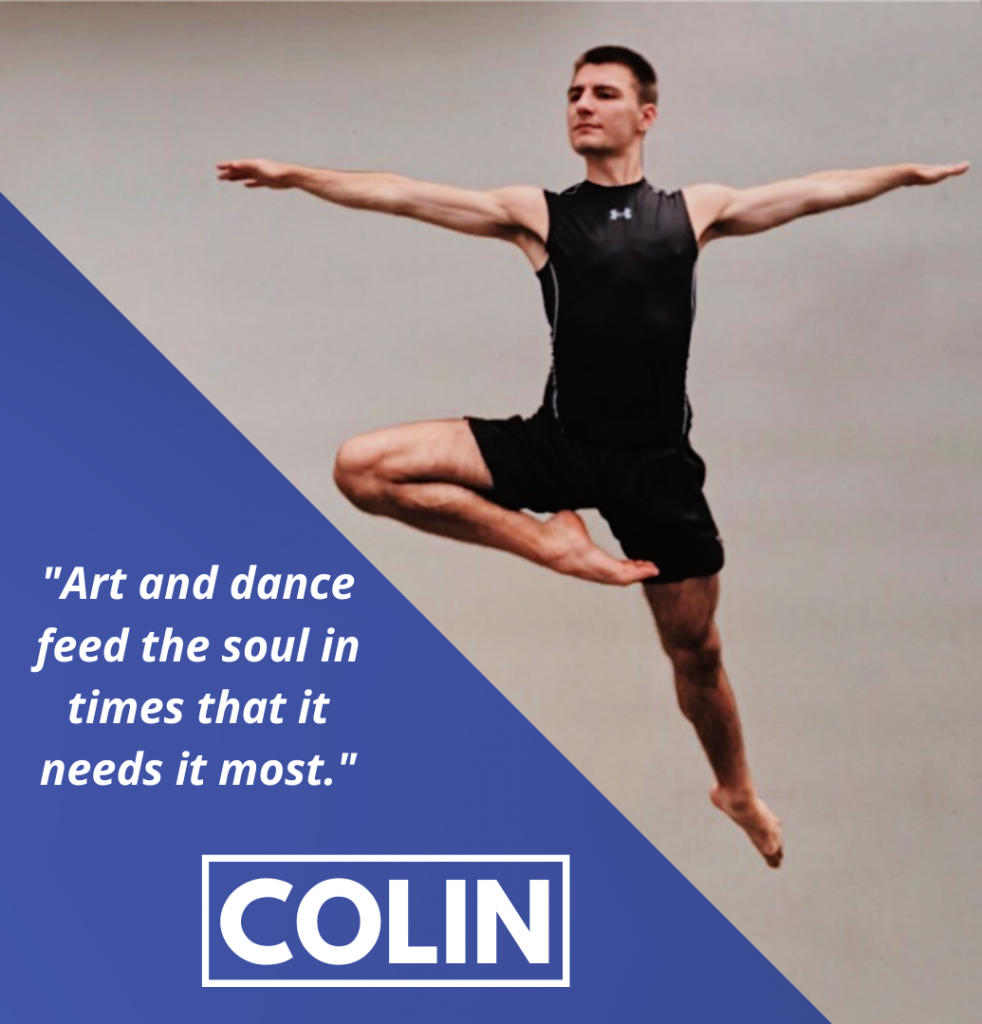
What is the first memory you have of dancing? How does it feel to reflect on that time? When I was young I spoke very little but used to dance around the house all the time and knocked my front tooth out on the coffee table when I was 3. The missing tooth gap I had for 5+ years represented the dancer that I was to become, and how in years to come my attachment to movement would become integral to my identity.
What about dance speaks to you? It is a universal language. Movement and dance feels very grounded in what it means to be a human. Babies dance before they speak.
When you are dancing, what do you feel? What thoughts do you think? I feel powerful and in control. I feel closest to myself when I dance. My very first dance teacher who completely shaped who I am as a dancer used to say “I dance because it feels good” — and that at the end of the day that is enough.
How has the extra time associated with the quarantine benefited you as an artist? It has made me more conscious of the difference of dance for expression vs. dance for performance. There is inherently a performative aspect to dance and an awareness of an audience of some kind, even if just taking class because the other dancers, or even in an empty studio because there’s the mirror. Taking all this away has made me dance simply for the purpose of dancing for myself and not for anyone else.
Are there any connections you can make to the nation’s current climate to dance – whether it be COVID, being quarantined, fighting for justice, etc. It is an interesting concept to me that artists are not considered essential workers, especially during a time in particular where everyone is turning to art and artists to help them through dark times. Art and dance feeds the soul in times that it needs it most.
Describe how you are feeling about working DGDC? The choreography is very detailed and I am grateful for my week in New York exploring and interpreting the choreography in a room of other dancers. Through all the details that needed to be drilled, you could start to see people interpreting the choreography in their own way while still remaining true to the dance. This unity and uniqueness duality is something I really love about the company. There was a harmony in the working space, and although everyone was working hard, we still had time to smile and enjoy each other’s company between runs.
What does The Fantasyland Project mean to you? Fantasyland is a world built on imagination and trust; in faith in humanity that many of us out there are yearning for a better world. By performing it, or by creating this world through the language of dance, we manifest it and then take action to make it happen, as well as inspire others to do the same.
What expectations do you have from apprenticing this summer? I am excited to learn how as artists we can explore this new realm of reality. At first I was just excited to perform in New York and work professionally with the company, but now the focus has shifted to coming together and adjusting under unprecedented circumstances.
Meet Maddy Hertel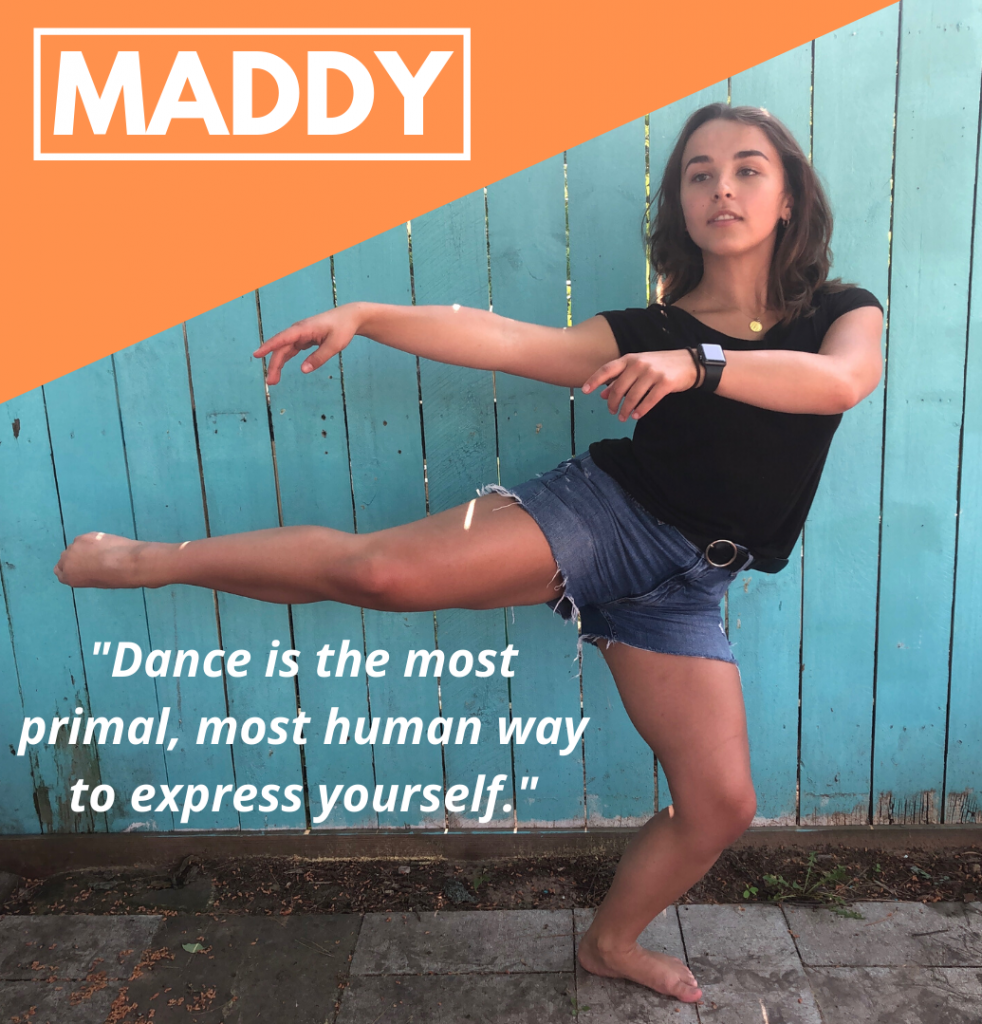
What is the first memory you have of dancing? How does it feel to think back on this The very first memory I have of dancing was in the living room of my childhood home. There was some dance movie on (maybe Center Stage?), and I was wearing my Cinderella nightgown trying to impersonate the dancers on the screen. My parents recorded this moment and it always makes me feel inspired when I watch the home video because it reminds me of the innocent curiosity and sense of play that got me started dancing and performing in the first place. Reflecting on that is a reminder to incorporate that intangible draw to the art form every time I dance.
What is it about dance that speaks to you? I strongly feel that dance is the most primal, most human way to express yourself. It doesn’t require language or any tools, besides your body and your soul, in order to dance. I feel the most connected to myself and to others when dancing which is what I think draws me to it as an art form.
When you are dancing, whether during a performance or just in your own bedroom, what emotions do you feel? What thoughts do you think? I feel joy! To dance, I think, is to be simultaneously in the present and in the future. I always find such a rush in using my muscle memory but also always thinking about the next moment in time. It can sometimes feel almost out of body in an exhilarating way. It allows me to forget myself in the sense of the ego and to be present with myself in the sense of the soul.
Has the extra time associated with the quarantine benefited you as an artist? If so, how? It has given me so much time with myself! I think there are definitely pros and cons in terms of artistry in this time. I am grateful for the opportunity, that I don’t typically focus on, to dance for joy and for pleasure. Sometimes in my practice I forget to dance just because it makes me happy, not in preparation for any class or performance – just for me.
Are there any connections you can make to the nation’s current climate to dance – whether it be COVID, being quarantined, fighting for justice, etc. Our nation is in a very liminal space right now. We are in the middle of a few very big, very important events and circumstances, with uncertainty at the other end of them. Dance itself is liminal; at the very threshold of human expression. I think dance is a modality of processing information and pushing forward the boundaries of the art form itself. I think dancers should be apt to understand and support the drive for a better future that we are in the midst of right now.
What can you say about dancing the choreography? What I love most about the works put out by DGDC is the absolute marriage of story and dance that is present in each piece I have seen. I am a dancer and actor that relishes in storytelling through movement and think that the two components are vital to one another. Having had the privilege of dancing a few pieces from the DGDC repertoire, I can attest that the choreography functions on many layers and requires full attention from every sense of the dancer; emotional, physical, spiritual.
What does The Fantasyland Project mean to you? The Fantasyland Project to me is an amalgamation of dreams, through dance, on screen. What I expect that we will find through it is that while we all might have wild, specific, outlandish fantasies, there is a common thread of humanity through them all. I look forward to noting these parallels.
What expectations do you have from this summer? I expect to be pushed, but also to have a professional experience that I have not been exposed to before! This is my first time working with a professional dance company and I am excited to be a part of the inner workings of it. It will be nice to put what I learn at school into application in real time.
Meet Neftali Benitez!
What is the first memory you have of dancing? How does it feel to reflect on that time so many years later? The earliest memory I have of myself dancing was on an elementary school stage with other students singing random kids songs for our parents. I remember wearing a cowboy hat at some point and having fun with everyone on stage singing silly kids songs and doing fun dance moves! It certainly wasn’t a “professional debut” by any stretch, but reflecting on it now makes it obvious to me how I went from goofing around on stage with my friends for fun to doing the same thing over ten years later as a career.
What is it about dance that speaks to you? Dance is the universal art. The world provides us humans with so many options for expressing ourselves but no other art form is so universally accepted as this one in my opinion. Every time a ballerina fouettés in concert, or a break dancing competition goes down at school, or even a friend of yours bobs their head to the song on the radio we are using dance to express our emotions. I think that’s what’s so amazing about it, there’s so many styles, techniques, cultures, and choices for just about everyone. If you throw a rock, chances are you’ll land on movement that speaks to you, even it’s as simple as the side shuffle in a club. Dancing is the way we tell people how we see ourselves, or how we’d like to be seen.
When you are dancing, whether during a performance or just in your own bedroom, what emotions do you feel? What thoughts do you think? My feelings about dance are not unlike Billy Elliot’s in the song “Electricity.” He speaks of it as almost an instinct that you can’t explain. No one else may see or feel it but it burns inside me, the need to express myself through dance. It’s almost like a therapeutic puzzle that when solved gifts me a sense of unparalleled relief and exuberant energy all at the same time! The song, much like my feelings, is full of oxymorons, however, it’s unmistakable after you’ve felt it for yourself. I still feel to this day with the education I’ve received in music, dancing, and acting that I truly feel most complete when I’m dancing. Ever since Hairspray, the very first main stage musical I performed in, I could say without a shadow of a doubt that I could dance for the rest of my life.
Has the extra time associated with the quarantine benefited you as an artist? If so, how? I’ve been utilizing this extra quarantine time in many different ways not exclusive to dance! I’ve taken time to focus on painting with spray paints and work on my music and singing in a more relaxed setting. It’s much different working all by yourself than having peers or teachers helping to guide your progress. You have to be your own rubric. That being said, I retreated quickly back to my dance studio at home to continue receiving lessons in dance one on one from my teacher at home. Dancing is just one of those skills I prefer face to face interaction and space to really stretch. I feel as though I went into the quarantine very hesitant and unwilling and will come out a more well rounded artist overall. This time expansion became exponentially more useful than I prognosticated when I realized how much more free time I had to really dig into all the art I could want.
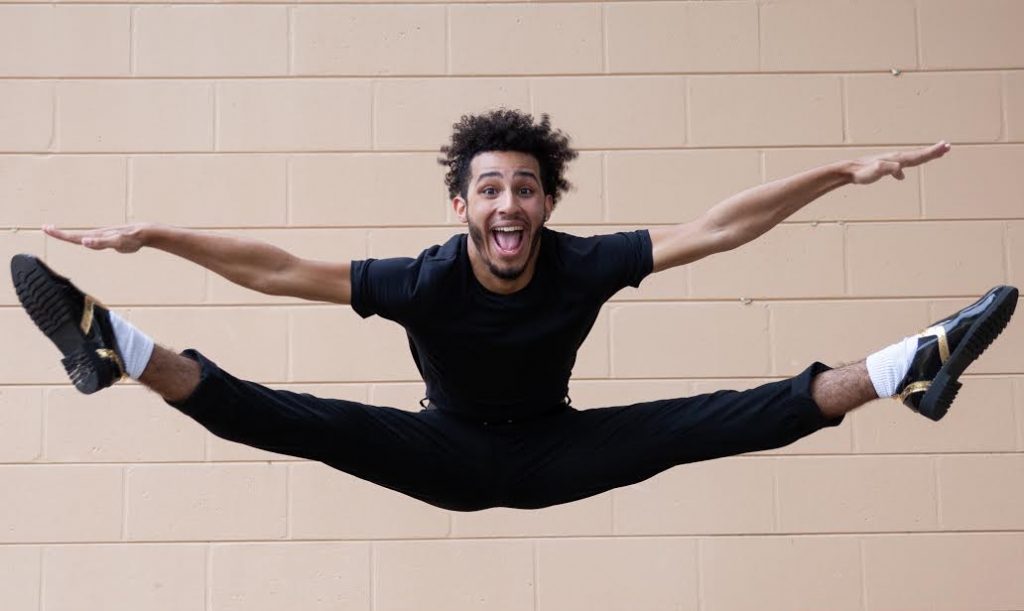 Are there any connections you can make to the nation’s current climate to dance – whether it be COVID, being quarantined, fighting for justice, etc. Someone said something to me a few days ago that continues to ring in my head after the fact. He said that in all rough and destructive parts of history, there has been a sort of “renaissance” that follows. It seems that the worse shape society is in, more beautiful and meaningful art than you could ever imagine is released into the world. We’ve already seen but a small fraction of what we can accomplish as artists in just a few months, and the year is not over yet. I believe the issues we’ve seen with Covid-19, civil justice, quarantine, the President and others will continue to pressurize our lives far longer than a year, however, hope is not lost. Quite the contrary, hope can be seen and felt in every piece of art we’ve been able to produce. These frustrating issues are the driving force that builds the artists momentum to seek change. Hope will continue to drive us to create more and more polarizing art until our fight is over and the Renaissance begins.
Are there any connections you can make to the nation’s current climate to dance – whether it be COVID, being quarantined, fighting for justice, etc. Someone said something to me a few days ago that continues to ring in my head after the fact. He said that in all rough and destructive parts of history, there has been a sort of “renaissance” that follows. It seems that the worse shape society is in, more beautiful and meaningful art than you could ever imagine is released into the world. We’ve already seen but a small fraction of what we can accomplish as artists in just a few months, and the year is not over yet. I believe the issues we’ve seen with Covid-19, civil justice, quarantine, the President and others will continue to pressurize our lives far longer than a year, however, hope is not lost. Quite the contrary, hope can be seen and felt in every piece of art we’ve been able to produce. These frustrating issues are the driving force that builds the artists momentum to seek change. Hope will continue to drive us to create more and more polarizing art until our fight is over and the Renaissance begins.
Describe how you are feeling about working with the Company. I could not have been more psyched to hear from Daniel that I would have an actual opportunity to perform this summer. At the time I was contacted, every theatre and dance class, every performance opportunity there once was vanished overnight. It was quite depressing yet I kept my spirits up and the work alive at home. It was such a relief to find out that there may be chance after all, and for that I am very thankful. I have always imagined myself working with a professional company and am interested in experiencing the workflow and quality expected from this medium. After working with Daniel in class as well as on Pippin at Ithaca College, I feel as though I’ve received a wealth of information about what’s expected of me as well as the style of work Daniel and DGDC produce. I’m most excited about starting this new choreography, being a massive fan of the work ever since we watched videos of the company performing for class and transferred the choreography onto our own bodies.
What does The Fantasyland Project mean to you? The more I learn about the vision for the project and explore my own ideas the more clear the message becomes to me. After thinking on this topic for a little while, I believe that The Fantasyland Project is a sort of celebration of our dreams. Big or small, personal or global. Here is a great opportunity to express our unrest during these trying times when the world seems to be converting to chaos by presenting alternate versions of life. Though not every fantasy falls under this umbrella, it’s important to remember to highlight individual journeys and fantasies as well…things we aspire to achieve within our lives as well as the lives of all else around.
What expectations do you have from apprenticing this summer? I have always imagined myself one day earning my place in a dance company. This apprenticeship will be a fantastic opportunity for me to truly understand what it means to be part of a preexisting system creating art as a profession as opposed to purely education or pleasure. I’m hoping to come out of the summer well equipped with a deeper understanding of the workflow of learning and performing new choreography while leveling my professionalism to that of seasoned pros. I see this being an amazing first step into the professional world of my career.
